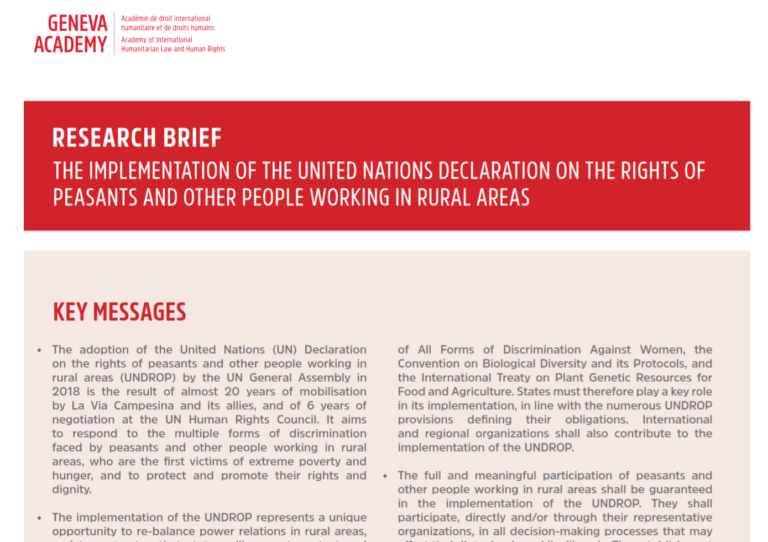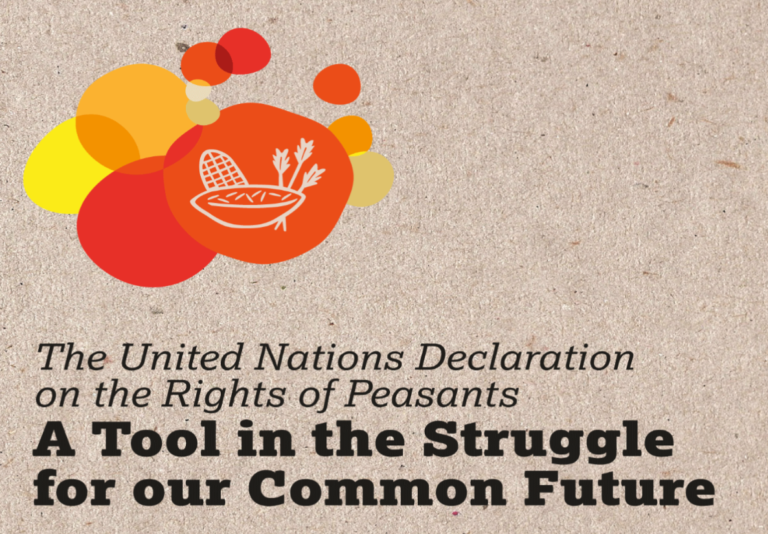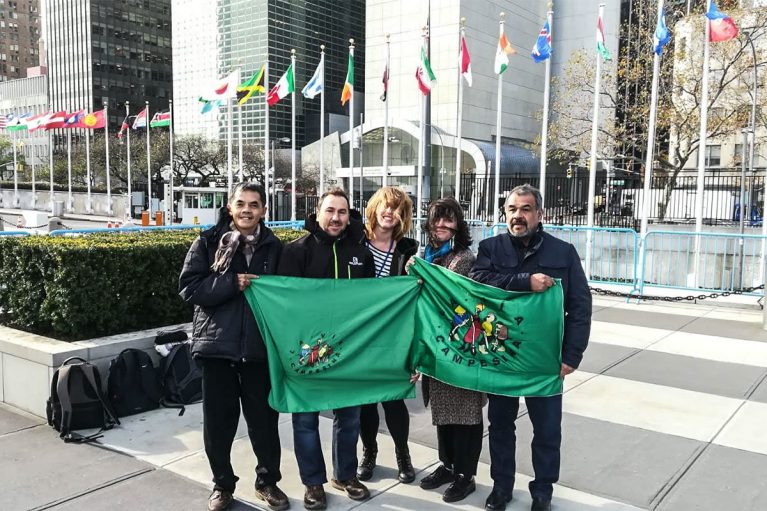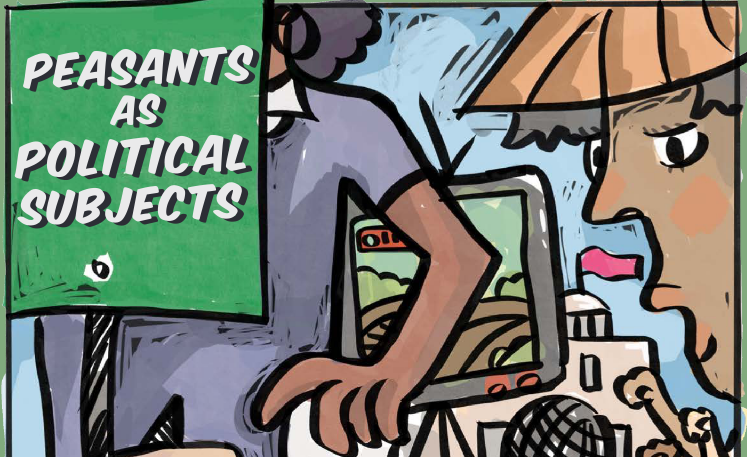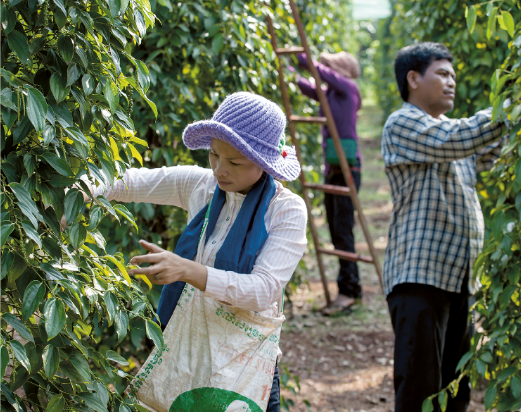INTERACTIVE UNDROP – Article 2 : States’ Obligations
Article 2 of UNDROP deals with the general obligations of States in respect of all the rights enshrined in the Declaration.
Article 2.1 takes up the typology of State obligations recognized in international law, the obligations to respect, protect and fulfill all human rights.
The obligation to respect the rights of peasants and others working in rural areas requires States to refrain from interfering with these rights in an unjustified or arbitrary manner. The State includes all its components at national and local level, and all public, executive, legislative and judicial powers. The State must respect the rights of all individuals on its territory (including foreigners present on its territory) and under its jurisdiction (state nationals present abroad).
The obligation to protect these rights means that the State must prevent violations by third parties (third-party States, individuals, companies, multinationals, etc.). Specifically, it must :
- take precautions against the risk of violations.
- guarantee compensation if these rights are violated.
The obligation to realize these rights implies that the State must facilitate and guarantee their realization, notably through the adoption of laws, policies and programs, and the allocation of resources, financial aid and so on.
Article 2.1 provides that States must make a special effort to implement those rights in the Declaration that cannot be guaranteed immediately.
They shall promptly take legislative, administrative and other appropriate steps to achieve progressively the full realization of the rights of the present Declaration that cannot be immediately guaranteed.
Article 2.2 specifies that the application of the Declaration must take into account the needs of the most vulnerable people (the elderly, the disabled, women, young people, children), because they are subject to multiple forms of discrimination that must be addressed.
Article 2.3 requires States to consult and cooperate in good faith with peasants and other rural communities before adopting any measure (national, international, legislative, political, commercial, etc.) that could have an impact on their rights. It is the counterpart of the individual and collective right to participation enshrined in article 10. This obligation specifies that participation must be “active, free, effective, meaningful and informed”, recalling the notion of free and informed consent guaranteed to indigenous peoples in article 19 of the UN Declaration on the Rights of Indigenous Peoples. These rights are so similar that it is made clear at the beginning of this paragraph that this obligation of States does not preclude their obligations towards indigenous peoples, and vice versa.
Dans ces consultations, les États doivent aussi tenir compte des « déséquilibres de pouvoir existant entre les différentes parties ». Cette précision est nécessaire au vu des répartitions syndicales paysannes souvent disproportionnées. Par exemple, cela signifie que l’État ne peut pas simplement consulter le syndicat majoritaire mais devrait aussi coopérer avec les autres représentants paysans.
L’article 2.4 fait de l’UNDROP un document clé pour l’élaboration, l’interprétation et l’application des autres engagements internationaux des États. Ainsi, la mise en œuvre des accords de l’OMC comme l’Accord sur les aspects des droits de propriété intellectuelle qui touchent au commerce (ADPIC) ou encore des politiques européennes comme la Politique Agricole Commune (PAC) doivent se faire en conformité avec la Déclaration. Cela protège aussi les droits consacrés dans l’UNDROP lors de la création de nouvelles normes internationales ou régionales qui ne pourront pas aller à l’encontre des droits des paysan.nes et des autres personnes travaillant dans les zones rurales.
Article 2.5 specifies the State’s obligation to ensure that the private actors they are in a position to regulate, such as commercial enterprises and transnational corporations (TNCs), not only respect peasants’ rights but also strengthen them. This is crucial, given that TNCs in the agri-food and agro-industrial sector cause serious damage to peasants’ rights. Ensuring that they respect and reinforce these rights requires considerable vigilance on the part of the State, and concrete measures.
Article 2.6 deals with the obligation of States to cooperate internationally to reinforce the rights contained in the UNDROP. States must cooperate with each other (bilaterally and multilaterally), with international and regional organizations, and with civil society, including farmers’ organizations. By way of example, five measures are listed in this paragraph. One is to improve global market management and facilitate timely access to market information, including on food reserves, in order to limit the extreme volatility of food prices and make speculation less attractive.
a. Ensuring that relevant international cooperation, including international development programmes, is inclusive, accessible and pertinent to peasants and other people working in rural areas;
b. Facilitating and supporting capacity-building, including through the exchange and sharing of information, experiences, training programmes and best practices;
c. Facilitating cooperation in research and in access to scientific and technical knowledge;
d. Providing, as appropriate, technical and economic assistance, facilitating access to and sharing of accessible technologies, and through the transfer of technologies, particularly to developing countries, on mutually agreed terms;
e. Improving the functioning of markets at the global level and facilitating timely access to market information, including on food reserves, in order to help to limit extreme food price volatility and the attractiveness of speculation.



